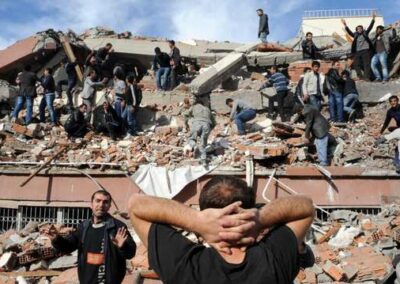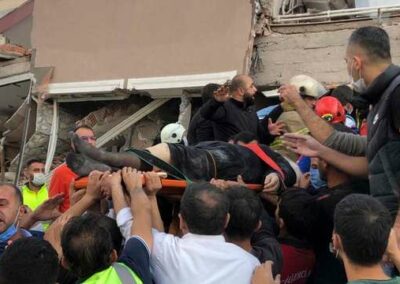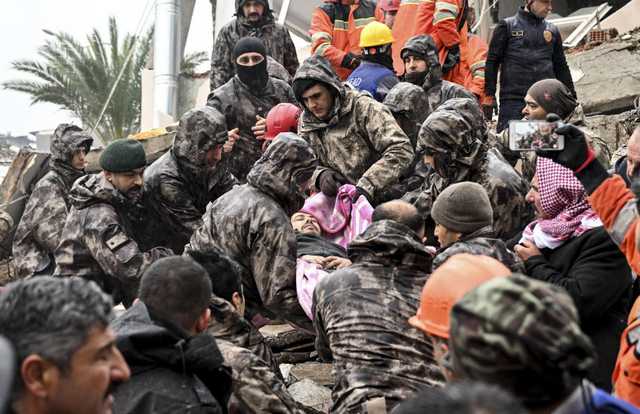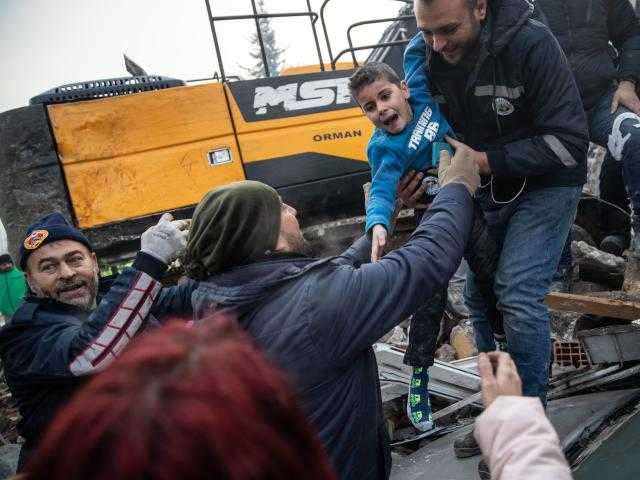A 7.8 magnitude earthquake has struck Turkey and parts of Syria, killing more than 500 people and injuring over 3,000 others. According to Syria’s assistant health minister, Ahmed Dhamiriyeh, about 237 people have died in Syria, and 639 others were injured as of Monday morning.
According to a statement released by the White Helmets, the group that controls Northwestern Syria, it described the sudden event as disastrous, saying more people were trapped under the rubble.
“The White Helmets has declares a state of emergency in northwestern Syria following a catastrophic earthquake that has caused destruction, devastation, and collapse of buildings and residential areas,” the statement reads. “The earthquake has resulted in hundreds of injuries, dozens of deaths, and people being stranded in the winter cold. Adverse weather conditions, including low temperatures and stormy weather, have compounded the dire situation.”
The government-held areas of Syria were not left out. At least 100 people were killed in the provinces of Aleppo, Latakia, Hama and Tartus.
More deaths in Turkey
The earthquake, which is described as one of the worst to hit Turkey in the last 100 years has killed at least 248 people, according to the country’s vice president, Fuat Oktay. He added that more than 2,300 others were injured as of Monday morning.
The country’s emergency relief agency AFAD said damages were reported in Kahramanmaras, Sanliurfa, Diyarbakir, Gaziantep, Adana, Osmaniye, Malatya, Kilis and Hatay. It added that 42 aftershocks were recorded after the disaster.
“I have never felt anything like it in the 40 years I’ve lived,” Erdem, a resident of Gaziantep, told Reuters on Monday, adding that the tremor rocked buildings in the Turkish city “like a baby in a crib.”
It was still dark when the deadly quake happened, and the extent of damage was difficult to ascertain at that moment. However, as the morning sun lights up the day, the damages became obvious and truly, it could be described as a disaster.
Instabul’s Governor, Ali Yerlikaya, said rescue operations were underway by the emergency disaster agency for trapped victims.
“80 AFAD (emergency disaster agency) officers, 27 accredited municipalities and NGOs, 968 Search and Rescue volunteers, 4 K9 dogs, 2 trucks and aid materials have been sent to the area impacted by the earthquake,” Ali Yerlikaya wrote on Twitter.
On his part, the Turkish President, Tayyip Erdogan, said rescue teams were immediately deployed to the affected areas, and they have been working to save as many lives as possible.
“I convey my best wishes to all our citizens who were affected by the earthquake that occurred in Kahramanmaraş and was felt in many parts of our country. All our relevant units are on alert under the coordination of AFAD,” Erdogan tweeted.
There are at least 1,000 rescue operators and volunteers were deployed from Instabul to the affected areas.
Overwhelmed hospitals in Syria
Following the deadly earthquake on Monday morning, the Syrian American Medical Society said the hospitals in the affected areas are overwhelmed, and victims are lying in the hallways.
“Many hospitals are full, but some critical facilities, including Al Dana Hospital, had to evacuate patients after sustaining severe damage from the earthquake. Likewise, the Idleb Maternity Hospital was forced to transfer all newborns to a nearby hospital,” the SAMS stated.
It added that there was an immediate need for “trauma supplies and a comprehensive emergency response.”
An earthquake so powerful, it is felt in Israel and Lebanon
To explain the severity of the disaster, Israelis at home in Jerusalem and Tel Aviv said they felt the shaking from the deadly earthquake. The Israeli Police said they received at least 3,000 reports from citizens. Thankfully, there were no injuries recorded in any part of the country.
Like Israel, Lebanon also felt the shaking of the ground. Metrologist Brandon Miller told CNN that the shaking in Lebanon could be up to 4 to a 4.5 equivalent of the earthquake’s magnitude.
“All the way down to Lebanon, it was around a 4 to a 4.5 is the equivalency of the magnitude of shaking they felt,” Miller told CNN. “Northern Syria, in Aleppo they felt shaking equivalent to between a 6 and a 6.5 magnitude earthquake.”
“A quake of this magnitude and in this part of the world, the shaking goes on for a long way. As you get closer to that epicentre the shaking is greater,” Miller added.
At the time of this report, there was no report of death or injury in any part of Lebanon.
The call for international help
The severity of the earthquake is so serious, both affected countries could not handle the situation alone. Hence they are calling on those who could help to immediately do so to reduce the extent of the damages.
The White Helmet, which is the Syrian opposition group that controls parts of the country, in its statement called on the international community to “take responsibility” to prevent the situation from worsening.
“The organization calls on the international community to take responsibility in the face of this catastrophe and to take emergency measures to prevent the situation from worsening,” part of the White Helmet’s statement reads. “It also urges the international community to support the rescue of civilians in Syria and to put pressure on the Assad regime and its Russian ally to ensure that there is no bombing in the affected areas.”
Following the earthquake, the group declared a state of emergency so that all hands could be on duty to save more lives.
Help is on its way
Following the shocking earthquake, leaders of several countries sent their condolences to the people of Syria and Turkey. However, other countries have done a little more than that.
Soon after the news of the earthquake broke out, the Netherlands said it would send rescue operators to help find bodies beneath the rubble. The country’s foreign minister Wopke Hoekstra said the team would arrive in Turkey as soon as possible.
“This team includes police and military personnel, first aid responders, and firefighters,” Hoekstra said on Twitter.
Yoav Galant, Israel’s Defense Minister, said his country is preparing to send emergency aid to Turkey after the deadly earthquake.
“The security forces are ready to offer whatever assistance is required. The security system has gained a lot of experience over the years in dealing with disaster areas and in the mission of saving lives,” the minister said in a statement.
The United States said it is studying the situation to determine how best to help the Syrian and Turkish people. Surprisingly, the President of warring Ukraine said his country would be willing to assist in whatever possible way.
“We extend our condolences to the families of the victims and wish the injured a speedy recovery. We are in this moment close to the Turkish people, ready to provide the necessary assistance,” Zelenskyy wrote in Turkish on Twitter.
Germany said it is ready to assist the two countries affected by the powerful quake.
“My thoughts are with the families of those who lost their lives in these terrible earthquake and those who still fear for their relatives, friends or neighbours,” Germany’s foreign minister, Annalena Baerbock, wrote on Twitter. “Together with our partners, we stand ready to provide assistance.”
Anadolu, Turkey’s news agency, reported that Azerbaijan would be sending a team of 370 people and aid materials to Turkey. As of Monday morning, a plane carrying aid, including medical supplies and tents was already set to depart for Turkey.
The death toll could reach 1,000 or even 10,000
Despite the hard work of rescue operators, there is very little they would do to prevent the death toll from hitting 1,000. The United States Geological Survey made the prediction after considering the population of the area and other factors.
“High casualties and extensive damage are probable and the disaster is likely widespread,” the USGS stated Monday.
The agency predicted that there is a 47% possibility that the death toll could reach 1,000 to 10,000 people and a 20% chance that between 10,000 to 100,000 people could die from the quake.
The cold weather could worsen the situation
The cold weather in the affected areas could be another challenge for the rescuers. In Syria and Turkey, early February is usually the coldest part of the year. However, this year’s extremely cold winter has caused temperatures to be colder than average. Unfortunately, there is no hope that things will get better as temperatures in some parts have fallen to about -6 degrees celsius.
Despite the cold weather, officials are asking residents to leave their homes for safety. With the current situation, officials and residents in affected areas might find it difficult to cope with the extreme weather.








A very sad one. Thanks for sharing.